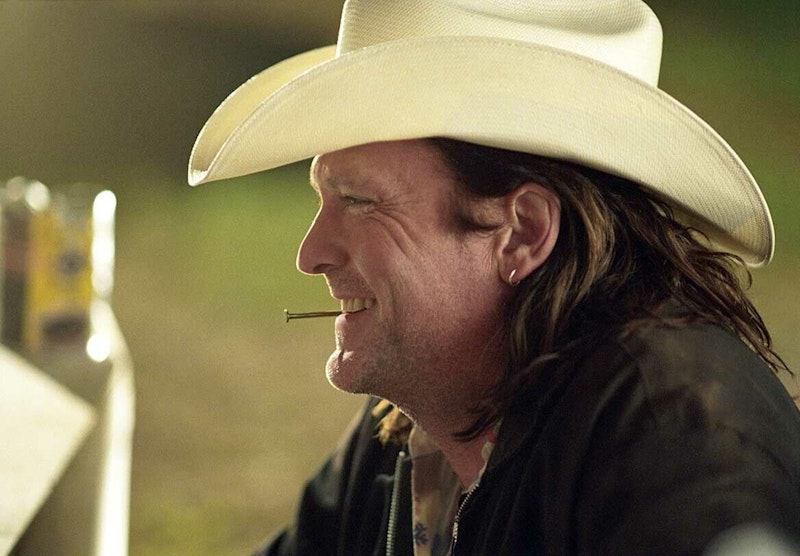In Kill Bill, Michael Madsen plays Budd Buchinsky, an international hitman and member of the DiVAS, or the Deadly Viper Assassination Squad; his brother, Bill, runs the organization. In the profession, he’s known as “Sidewinder,” and among peers—Vivica A. Fox, Lucy Liu, Daryl Hannah—he’s known as the terminal fuckup who never recovered from their hit on their former partner’s wedding party. The film opens with a close-up of Beatrix Kiddo, aka “The Bride” (Uma Thurman), and the damage has already been done: her few friends and family are dead, along with her fiancé, and Bill (David Carradine) has come to finish her off. He puts a bullet in her head—we see as much—but she survives, albeit in a coma. Five years go by, the DiVAS split up, and while Hannah and Liu continue working in the criminal underworld, Fox and Madsen try to lead normal lives. Fox succeeds, with a home in Pasadena and a young daughter; unfortunately, the latter is witness to The Bride chucking a knife right into Fox’s heart. She tells the little girl she deserves her revenge just as much as The Bride deserves hers.
And Madsen agrees with The Bride, in his most famous line from the movie: “That woman deserves her revenge… and, we deserve to die… but, then again, so does she, so… we’ll just see, won’t we?” Budd Buchinsky may share a given name with Charles Bronson, but by the time Hannah catches up with him, he can barely put up a fight. She kills him with a snake; if The Bride is upset by being denied the pleasure of exacting her revenge personally, she doesn’t show it—she’s probably a little grateful that Budd hung onto his Hanzo sword, a “priceless” gift that, as he told his brother Bill, he sold to an El Paso pawnshop. Well: he was fucking around. The sword is inscribed: “To Budd—the only man I ever loved.”
Michael Madsen should’ve had a boost after Kill Bill, but his career was stuck in DTV limbo and token supporting parts/cameos in other movies by Quentin Tarantino and Robert Rodriguez. After a sensational breakout role as Mr. Blonde in Reservoir Dogs, Madsen made one huge mistake: he signed on to Lawrence Kasdan’s Wyatt Earp, a 190-minute Kevin Costner vehicle that bombed and, worse, prevented him from taking the role of Vincent Vega in Pulp Fiction, a part that Tarantino wrote for Madsen. After that, he was in Free Willy, once ubiquitous and strangely somewhat forgotten now; Donnie Brasco, an undistinguished Al Pacino movie; and, for at least a few minutes, Die Another Day, the last James Bond movie with Pierce Brosnan. That was 2002, right before Kill Bill; besides appearing as one of the eight in Tarantino’s 2015 The Hateful Eight, Madsen wasn’t around much, wasn’t present—even if he was working constantly. It was always under the radar; when he showed up in Once Upon a Time in Hollywood, as the first character with any lines, I was reminded that not only was Madsen still working, that he was alive, and, presumably, healthy.
Madsen was a poet, and a new book, Tears for My Father: Outlaw Thoughts and Poems, is due out early next year. Included in nearly all of Madsen’s obituaries is Tarantino’s forward to the book: “For me, the real journey that Michael the writer is exploring is what it means to be a man in a world where the notions of manhood that some of us grew up with are barely remembered. But then if everybody embarked on the hero’s journey, everybody would be a hero, wouldn’t they?” If Madsen was around in the late-1960s and 1970s, if he was supporting people like Bronson, Eastwood, McQueen, he might’ve had a steadier career; it’s also easy to imagine him becoming a minor star, given material and a role on par with Mr. Blonde in Reservoir Dogs; he could’ve been the missing Mitchum kid when those guys (and their dad) were still headlining films. Imagine Madsen in Trackdown, or any of the Dirty Harry films. He was an actor misplaced in time.
If Madsen was mostly absent from above-ground cinema for most of this century, it wasn’t necessarily because of his career choices or on-and-off substance abuse; movies haven’t allowed gruff and occasionally criminal actors to participate in a long time. Procedurals and thrillers slowly decline in quantity and quality, and someone like Madsen has nowhere to go. Eastwood aged into a fine career as a director after his last Dirty Harry movie in 1988; no one has become the new Bruce Willis, Tom Cruise, Val Kilmer. But even they’re safer than Madsen, who belonged in Sam Peckinpah’s repertory company. Not only are actors like Madsen vanishing—so is their material, our bread and butter.
—Follow Nicky Otis Smith on Twitter: @MonicaQuibbits

